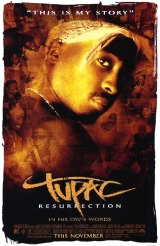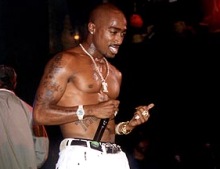| Tupac: Resurrection |
| |
 |
Documentary. USA, 2003. Rated R.
90 minutes.
Cast:
Tupac Shakur, Afeni Shakur, Suge Knight
Film Editing: Richard Calderon
Cinematography: Jon Else
Producers: Karolyn Ali, Preston L. Holmes, Lauren Lazin
Director: Lauren Lazin
LINKS
|
" got
shot"—powerful words to open a documentary. For a moment, it seems as though
director Lauren Lazin has achieved the impossible and smuggled a microphone
into the afterlife. Of course, Tupac's words must have originally referred to
his November 1994 shooting in midtown Manhattan during a robbery, which Tupac
somehow survived despite taking several bullets from his assailants. The thoughts
Tupac expresses, though, could easily apply to his violent death two years later.
got
shot"—powerful words to open a documentary. For a moment, it seems as though
director Lauren Lazin has achieved the impossible and smuggled a microphone
into the afterlife. Of course, Tupac's words must have originally referred to
his November 1994 shooting in midtown Manhattan during a robbery, which Tupac
somehow survived despite taking several bullets from his assailants. The thoughts
Tupac expresses, though, could easily apply to his violent death two years later.
Before examining the latest film about the violently truncated life of Tupac
Shakur (rap star "2Pac"), let me confess that I know little about the man, for
many an icon of the stature as Jim Morrison, Jimi Hendrix, or Kurt Cobain. I
can't analyze his artistic influences. I can't trace his own influence on artists
who came after. I can't speculate on the mystery surrounding his 1996 murder
in Las Vegas. I don't own any of his music, although after seeing this film,
that may change. I can tell you, however, that Tupac: Resurrection is
a fascinating documentary.
Don't expect investigative reporting. Basic facts about Tupac's life are missing,
particularly about his murder, which has never been officially solved. The many
theories, some of which point the finger at Death Row Records chief Suge Knight
(the driver of the vehicle in which Tupac was shot), are here left unprobed.
Instead, Tupac: Resurrection tries to show who Tupac was, examining his
life experiences, his perspective on the world, and his many, many contradictions.
Like the excellent The Kid Stays
in the Picture, Tupac: Resurrection is a trip through a man's
head.

Tupac Shakur performs in Tupac: Resurrection |
The entire film is narrated by Tupac himself. First-time feature director Lauren
Lazin, a veteran PBS and MTV documentarian, has spliced together audio from
Tupac's many interviews to create amazingly seamless narration going over the
whole of his life. Tupac touches on his Blank Panther mother Afeni Shakur (whose
reverent treatment may be partly attributable to her serving as an executive
producer) and describes growing up poverty-stricken in New York City. He attends
the Baltimore School for the Performing Arts with middle-class white kids as
a young teen, then moves out to the West Coast, where he begins hanging out
with the Wrong Crowd. Nonetheless, he continues pursuing his dream to be a performer,
and meets success quickly as a rapper, actor, and poet. As his fame grows, so
does the controversy and violence.
Tupac Shakur's contradictions are extreme. He is both a thug and a leader,
his music both poetic and profane. We are talking about a man who was arrested
numerous times and intimately familiar with the inside of a prison. Yet we are
also talking about a passionate, eloquent artist who remains one of the best-selling
rap stars in the world. Lazin shows how Tupac creates the concept of "Thug Life"
(a marketing brand for himself, basically), then denies that it glorifies criminality.
Tupac attacks Eddie Murphy and Arsenio Hall for hating black people and Quincy
Jones for "sticking his dick in white women," but he reminisces fondly about
his friendships with Mickey Rourke and Tony Danza (of all people!) "I got a
big mouth. Can't help it," Tupac says.
Then, there is the matter of Tupac's treatment of women. He talks of his love
and respect for them, claiming not to "have a predator thing going." Yet allegations
of sexual assault and abuse dog him all his life. In his music, he refers to
women as hos, bitches, and sluts. His explanation? Apparently, bitches are women
who sleep with guys only for money or to be associated with celebrity—they
are the same women who wouldn't give Tupac the time of day before his fame.
He has no respect for them, but that doesn't stop him from having sex with them.
Tupac's contradictions make a lot more sense when you remember that he only
lived to be twenty-five years old. Despite his accomplishments, this was just
a kid, denied the opportunity to mature by his killers. Instead, what Tupac:
Resurrection leaves us with is a portrait of an intelligent, enormously
talented, and undeniably charismatic artist who by the end of his life had become
a master of spin, and was buying too much into the image he had created for
himself. One of his most revealing statements is when he explains how he doesn't
have to tell the truth; he just has to tell a story.
Tupac: Resurrection is one of the many studies of Tupac Shakur, whose
life and death have become fertile ground for artists and the media. There have
been films and television documentaries—among them the always controversial
Nick Broomfield's Biggie & Tupac, Ken Peters' Tupac Shakur: VS.,
and the obligatory VH1 specials. There have been plays—including Up
Against the Wind, written by Michael Winn, which enjoyed a short but successful
run at the New York Theater Workshop in 2001. There have been numerous books. Some are faithful attempts to do justice to the man and his art. Others
are exploitative. Many have political and cultural agendas. But Tupac: Resurrection
is the only work that presents Tupac's life as he himself might have told it,
in his own words. You could argue that because Tupac: Resurrection is
so subjective in its point of view, it has no journalistic value, but there
is certainly humanistic value—a great deal of value—in understanding
how an influential artist saw the world.
Review
© November 2003 by AboutFilm.Com and the author.
Images © 2003 MTV Networks and Amaru Entertainment, Inc. All Rights Reserved.


